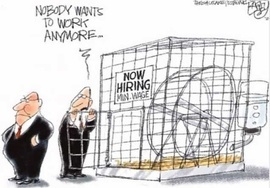Enjoy being online again!
Welcome to the community of good people who base their values on evidence and appreciate civil discourse - the social network you will enjoy.Create your free account
2 comments
Feel free to reply to any comment by clicking the "Reply" button.They have been finding people to work overseas for less than minimum wage every since the Berlin Wall, the Iron Curtain, and the Bamboo Curtain fell in 1989.
Why do I get the feeling that you believe you've made a relevant point?
BD66:
@redbai OK, Here is the long version:
It’s best to look at the issue in terms of supply and demand. During WWII, almost every industrial country in the world had its infrastructure bombed out. The countries were almost bankrupt as well. The United States was the most notable exception. We emerged from the war with a large portion of the world’s investment capital, a large portion of the world’s industrial infrastructure, and only 5% of the world’s labor. In terms of supply and demand, there was a huge demand for US labor and a small supply of US labor, thus US laborers enjoyed a standard of living they never had before and never will again.
During that time, (the 1950’s), a kid in my home town could drop out of high school, get a job at CAT operating a drill press, get married, buy a house, buy a car, raise a family, then retire at age 50 with a pension and healthcare benefits for the rest of his life.
What killed all that was the Marshall Plan and our obsession with winning the Cold War. If US Corporations had been allowed to keep more of their profits, they would have had more money to pour back into their factories, so the demand for US labor would have continued to grow, but The Marshall Plan and Cold War related spending took most of the profits from running factories and industries in the United States and sent those profits overseas to countries like Japan and Germany to help them build their factories, and it also sent the profits into the defense industry so we could defend the entire “Free World”
By the early 1970’s you started to see VW bugs, Mercedes, BMW, Toyota, and Honda cars on the road. You also started to see Sony consumer products in the home. That would not have been possible so early if the US Government had not taxed US companies at such extremely high rates and sent that money overseas to be invested in foreign factories.
By the late 1970’s there was so much foreign competition it took away almost all collective bargaining power of US unions. When CAT workers went on strike in 1978 and 1983, CAT management crushed the unions. Similar things happened in the same time frame in the auto industry. There was already enough labor that could be tapped in foreign countries that it was no longer possible for US workers to demand a huge premium over their foreign counterparts.
Now move forward to the end of the Cold War. When the Iron Curtain and the Bamboo Curtain fell, the labor of people in Eastern Europe, the USSR, China, Vietnam, and India became available to anyone who had money to invest. The world’s supply of free-market labor increased by a factor of about 5, while the world’s supply of capital did not increase by much at all. So with much more labor and only a little bit more demand for that labor, the price of industrial labor went way down.
It became extremely profitable to move the textile factory from Massachusetts to Vietnam or India because the labor there was 10 to 100 times cheaper. Globalization made possible by the end of the Cold War was a good thing for the majority of low-skilled laborers around the world. It brought about a huge improvement in the standard of living for workers in China, Vietnam, Malaysia, and India. However it was a terrible thing for low-skilled laborers in the USA because they have been forced compete on an equal footing with laborers in other countries that were once making 10 to 100 times less than they were for each hour of work.
The only thing left in the USA is service work, and now (when the government has been paying people not to work and make it impossible to evict tenants for not paying their rent), there is a shortage of people in the service industries, which leads to lack of service and inflation. The people hurt most by this are the middle class and lower-middle class because they are the ones paying extra for gasoline, groceries, dining out, etc.
BD66:
@redbai The point:
The Marshall Plan: Huge Mistake
Spending $6,000,000,000,000 to win the Cold War: Huge Mistake
The people who are paying for the mistake are those who once had the great blue-collar jobs in the USA.
The Capitalists are doing just fine. They still have access to worldwide labor.
BD66:
@redbai They were constrained to hire American workers during the Cold War. After we "won" the Cold Sar, someone who had the money to build a factory could go just about anywhere in the world to build that factory, so they built the new factories in the countries with the lowest wages. They produce cheaper products. They make more profits. It's a net benefit to workers and consumers around the world, but it sucks for American workers.
This is exactly what the ones running the show in America do not get or understand.
Enjoy being online again!
Welcome to the community of good people who base their values on evidence and appreciate civil discourse - the social network you will enjoy.Create your free account
Share this post
Categories
Agnostic does not evaluate or guarantee the accuracy of any content. Read full disclaimer.








